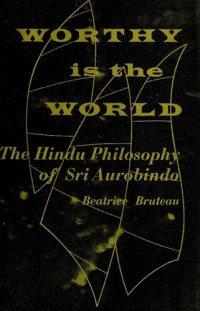
Ebook: Worthy is the World: The Hindu Philosophy of Sri Aurobindo
Author: Beatrice Bruteau
- Genre: Other Social Sciences // Philosophy
- Tags: hindu philosophy, aurobindo, worthyisworldhin0000brut
- Year: 1971
- Publisher: Associated University Press
- City: Cranbury, New Jersey
- Language: English
- pdf
For years Indian philosophy has been synonymous with varying degrees of world-negation. The world is “Maya,” somehow unreal; and equally illusory are the individual minds which dream they perceive it. Seen in this context, any human effort to improve the world must appear vain and absurd. The goal of life is escape from the deception into the mystical bliss of union with the transcendent Divine.
It is against this background that the work of the contemporary (d. 1950) Indian patriot and yogin, Aurobindo Ghose, must be appreciated. He did not deny the goal of divine union, but he pointed out that this union has three distinct poises: the Absolute is not only transcendent, but also cosmic and even individual. The same Scriptures which say that “Brahman is One without a second” also teach that “All this is Brahman” and that “Thou art That.” Essentially the self-expression of the Divine, the world is evolving toward the fullness of its own nature. The vocation of man, who is also radically divine in his unique individual personhood, is not to escape the world but to cultivate it, to bring it and himself to perfection. The individual person is worthy of eternal life and the world is worthy of his sincere devotion and dedicated action.
The worthiness of the world is detailed and justified in this study of Sri Aurobindo’s philosophy. After a brief exposition of Aurobindo’s spiritual history, the chief theses of his system are analyzed as a sequence of conclusions drawn from the most fruitful of his yogic experiences. Dr. Bruteau then focuses on Sri Aurobindo’s battle against Illusionism, marshalling Aurobindo’s arguments from logic, Scripture, spiritual experience, and practical life. The final chapters are devoted to Aurobindo’s own view of the value of the world and his inspiring vision of what free men, working in cooperation with Nature’s law of evolution, can bring to pass.
The reader familiar with the thought of Teilhard de Chardin will immediately recognize a strong similarity between the two men. For both, evolution is very far from being finished. Even greater transformations lie before us in which human personality will be delivered from the bondage of egoism and transfigured in universal love. For Aurobindo this projected transformation was no dream but a specific program of personal, social, and technological cultivation which today is being embodied in a new city, rising on the shores of the Bay of Bengal, supported by UNESCO and the Government of India, and named in his honor, Auroville.
It is against this background that the work of the contemporary (d. 1950) Indian patriot and yogin, Aurobindo Ghose, must be appreciated. He did not deny the goal of divine union, but he pointed out that this union has three distinct poises: the Absolute is not only transcendent, but also cosmic and even individual. The same Scriptures which say that “Brahman is One without a second” also teach that “All this is Brahman” and that “Thou art That.” Essentially the self-expression of the Divine, the world is evolving toward the fullness of its own nature. The vocation of man, who is also radically divine in his unique individual personhood, is not to escape the world but to cultivate it, to bring it and himself to perfection. The individual person is worthy of eternal life and the world is worthy of his sincere devotion and dedicated action.
The worthiness of the world is detailed and justified in this study of Sri Aurobindo’s philosophy. After a brief exposition of Aurobindo’s spiritual history, the chief theses of his system are analyzed as a sequence of conclusions drawn from the most fruitful of his yogic experiences. Dr. Bruteau then focuses on Sri Aurobindo’s battle against Illusionism, marshalling Aurobindo’s arguments from logic, Scripture, spiritual experience, and practical life. The final chapters are devoted to Aurobindo’s own view of the value of the world and his inspiring vision of what free men, working in cooperation with Nature’s law of evolution, can bring to pass.
The reader familiar with the thought of Teilhard de Chardin will immediately recognize a strong similarity between the two men. For both, evolution is very far from being finished. Even greater transformations lie before us in which human personality will be delivered from the bondage of egoism and transfigured in universal love. For Aurobindo this projected transformation was no dream but a specific program of personal, social, and technological cultivation which today is being embodied in a new city, rising on the shores of the Bay of Bengal, supported by UNESCO and the Government of India, and named in his honor, Auroville.
Download the book Worthy is the World: The Hindu Philosophy of Sri Aurobindo for free or read online
Continue reading on any device:

Last viewed books
Related books
{related-news}
Comments (0)